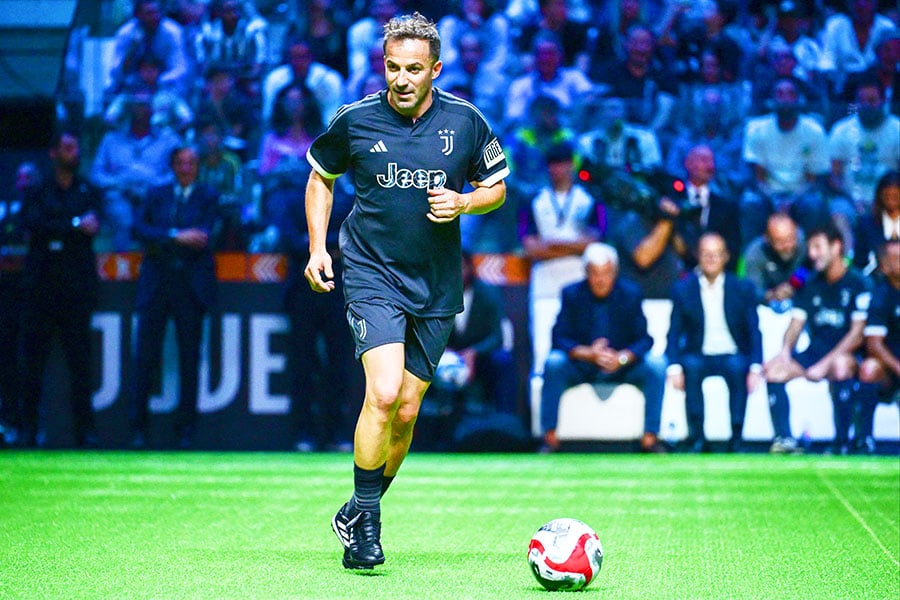
Never take your foot off the pedal: Alessandro del Piero
The football legend and the 2006 World Cup winner on what kept his hunger going for over two decades
 Juventus' former Italian player Alessandro Del Piero plays a football match during the "Together, a Black & White Show" event, the first Juventus party dedicated to all its fans, at the Pala Alpitour in Turin, on October 10, 2023. Image: MARCO BERTORELLO / AFP
Juventus' former Italian player Alessandro Del Piero plays a football match during the "Together, a Black & White Show" event, the first Juventus party dedicated to all its fans, at the Pala Alpitour in Turin, on October 10, 2023. Image: MARCO BERTORELLO / AFP
Legend, World Cup winner, pundit—Alessandro del Piero wears many hats. The Azzuri forward represented Italy in 91 caps and scored 27 times, the most talked-about being the second goal in the 2006 World Cup semifinal against Germany. Italy eventually went on to win the title, which del Piero considers the most precious of his illustrious career. In India, recently, for the RCB Innovation Lab x Leaders Meet: India, a two-day global sports conclave organised by IPL franchise RCB and sports event and media organisation Leaders In Sport, the soccer maestro spoke to Forbes India about what it takes to stay on top. Edited excerpts:
'Every loss helped me to move forward'
Growing up, I didn't have a role model to follow. We didn't have social media or the internet—the only way to know about other players was through the newspaper or watching their interviews on TV. Back then, my favourite and idol was Michel Platini, the French No. 10, who played for Juventus, the club I joined later and was part of for nearly two decades. When it came to my own game, I had my family's support, especially my dad, who was taking me everywhere. When I was about 13, I had to move to another city by myself, and my motivation came from following my passion and love for competition. I love challenges, and I hate to lose. Every time I would lose, I would take it as a big lesson and move forward. You learn from losses and how to turn them into better results subsequently. Losses are an introspective way to move forward.
'Move to Juventus was a turning point'
How did football go from a recreational pursuit to a profession? It's a stage-by-stage progression, not a particular moment when you choose football. When you are young, you compete with your friends and then go over to the first team of your little town, and then, as you become one of the best in that team, you move on to another one. For me, the big jump came when I moved from Padova, the club I started playing for in 1991, to Juventus, with big expectations from everybody. That one was a big challenge because going straight from the youth to the most important team in Italy was quite a lot to handle. The team had a bunch of champion footballers like Roberto Baggio and Gianluca Vialli, and I always kept my eyes peeled out to see what they were doing. And not just them; I was also closely watching top-notch players from the opposition, like Ruud Gullit, Marco van Basten, and Franco Baresi. Every match was a moment of learning.
Also read: LALIGA's India game plan: Using cricket to expand football horizon
'My dad's death gave me a reality check'
I've had big losses in my career and had a huge injury on my left knee that took me out for a year. But the toughest period for me was the period when my dad was diagnosed with cancer, which also eventually led to his death. It was difficult because it was a scenario outside of your imagination. At that point, I was young and focused on football; I started to earn money and give back to my family. So everything was going well. And then something like this happened. It was a reality check for me about life outside football.








